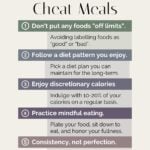Are cheat days ruining your weight loss progress, or could they actually help you stay on track? If you’ve ever felt torn between sticking to your diet and giving yourself a break, you’re not alone.
Understanding how cheat days affect your body and motivation can make all the difference in reaching your goals. Keep reading to discover the surprising truth about cheat days and how to use them wisely so they work for you, not against you.

The Concept Of Cheat Days
Cheat days are planned breaks from a strict diet. People use them to eat foods they avoid while dieting.
These days can help some people stay motivated and enjoy their diet more.
Origins And Popularity
Cheat days became popular with fitness and diet communities. They started as a way to balance strict eating plans.
Many fitness trainers and diet books promoted cheat days to prevent diet burnout. People liked having a day to relax their food rules.
Common Practices
On cheat days, people eat more calories than usual. They often enjoy sweets, fast food, or other restricted items.
Some common cheat day habits include:
- Eating favorite comfort foods
- Skipping calorie counting for the day
- Allowing larger portion sizes
- Using cheat days as a mental break
Impact On Metabolism
Cheat days mean eating more calories than usual for a day. Some believe they can help or hurt weight loss by changing metabolism. Metabolism is how your body uses energy and burns calories.
It is important to understand how cheat days affect calorie burn and hormones. These changes can influence weight loss results.
Effects On Calorie Burn
Eating more on cheat days can boost calorie burn for a short time. This happens because the body works harder to digest and process extra food.
This increase in calorie burn is called the thermic effect of food. It can help offset some calories eaten during cheat days.
- Extra calories raise metabolism briefly
- Body burns more energy to digest food
- Effect lasts a few hours after eating
- Does not fully cancel out high calorie intake
Hormonal Responses
Cheat days can change levels of hormones that control hunger and metabolism. These hormones include leptin and insulin.
Leptin helps control hunger and energy use. Eating more food can raise leptin levels, which may reduce appetite and increase calorie burn.
- Leptin rises after high calorie intake
- Higher leptin may reduce hunger
- Insulin helps manage blood sugar after meals
- Large meals cause insulin spikes
- Frequent cheat days can affect hormone balance
Psychological Effects
Cheat days are breaks from strict dieting. They let people eat foods they enjoy.
These breaks affect the mind and feelings during weight loss. Understanding these effects helps with diet choices.
Motivation And Adherence
Cheat days can boost motivation. Knowing a treat day is coming makes dieting easier.
They help people stick to their plan longer. Small rewards reduce feelings of restriction.
- Gives a mental break from dieting
- Reduces feelings of deprivation
- Encourages long-term diet commitment
Potential For Overeating
Cheat days may cause overeating. Some people eat too much and undo progress.
Overeating can lead to guilt and stress. This can hurt motivation and cause diet failure.
- Risk of eating more than planned
- Feelings of guilt after overeating
- Possible negative impact on weight loss

Cheat Days And Weight Loss Results
Many people wonder if cheat days hurt weight loss progress. A cheat day means eating more calories than usual once in a while. It can feel like a break from strict dieting.
Cheat days affect the body in different ways. Some changes are short-term, while others impact long-term progress. Understanding these effects can help manage weight loss goals.
Short-term Fluctuations
After a cheat day, the body may show quick changes. These changes do not always mean actual fat gain. Water retention and food volume cause weight to rise temporarily.
Short-term weight gain can last a few days. The body stores more glycogen and salt from high-carb meals. This storage pulls water into muscles and tissues, increasing weight.
- Water retention can add 1 to 3 pounds
- Food in the digestive system adds to weight
- Temporary bloating and fullness are common
Long-term Progress
Long-term weight loss depends on overall calorie balance. Occasional cheat days do not ruin progress if calories stay controlled most days. Consistency is key for fat loss.
Cheat days can help some people stick to a diet. They may reduce feelings of deprivation and prevent binge eating. Planning cheat days wisely avoids negative effects on progress.
- Keep cheat days rare and planned
- Return to normal eating after cheat day
- Track calories to maintain calorie deficit
- Focus on long-term healthy habits
Myths About Cheat Days
Many people wonder if cheat days help or hurt weight loss. There are common beliefs about cheat days that are not always true.
This article looks at two popular myths about cheat days and explains the facts behind them.
Cheat Days Boost Metabolism
Some think cheat days increase metabolism and burn more calories. The idea is that eating more tricks the body into working harder.
In reality, cheat days do not cause a big or lasting boost in metabolism. Your body adapts slowly to changes in calories.
Metabolism depends on many things like age, muscle mass, and activity. A single cheat day has little effect on it.
Cheat Days Cause Weight Gain
Many believe cheat days make you gain weight quickly. Eating extra calories once in a while does not cause permanent weight gain.
Weight can go up temporarily due to water and food in the body. This is not the same as fat gain.
- Temporary weight gain is normal after overeating
- Long-term weight gain happens with regular excess calories
- Cheat days can fit in a balanced plan without harm

Alternatives To Cheat Days
Many people wonder if cheat days are bad for weight loss. Cheat days can cause overeating and slow progress.
Instead of cheat days, try other ways to enjoy food without harming your goals. These methods keep your diet balanced and flexible.
Flexible Dieting
Flexible dieting lets you eat a variety of foods while tracking calories. It does not ban any food but focuses on balance.
This method helps you enjoy treats in moderation. You can eat what you like, as long as it fits your daily calorie goals.
- Track your calories and macros
- Include small treats daily
- Focus on nutrient-rich foods mostly
- Adjust portions to stay on target
Planned Treats
Planned treats are small, scheduled indulgences. You decide ahead what and when to eat a treat.
This approach stops binge eating and keeps your diet steady. It lets you enjoy favorite foods without guilt or excess.
- Choose your treat in advance
- Limit portion size
- Set a specific day or time
- Balance treats with healthy meals
Tips For Managing Cheat Days
Cheat days can help you enjoy your favorite foods. They also give your mind a break from dieting.
Managing cheat days well keeps you on track with weight loss. You can enjoy treats without gaining weight.
Portion Control
Eating large amounts on cheat days can undo your progress. Keep portions small to avoid overeating.
Try to eat slowly and stop when you feel full. Use smaller plates to help control serving sizes.
- Measure your food to know the right amount
- Limit high-calorie foods to one or two servings
- Drink water before eating to reduce hunger
- Avoid going back for seconds
Choosing Quality Foods
Pick cheat foods that taste good and satisfy you. Choose items with good ingredients and less sugar.
Whole foods like fruit or dark chocolate can be better choices. They provide nutrients and keep you full longer.
- Choose natural sweets like berries or yogurt
- Pick dark chocolate over milk chocolate
- Avoid processed snacks with many additives
- Enjoy homemade treats with simple ingredients
Frequently Asked Questions
What Is A Cheat Day In Dieting?
A cheat day allows for indulgences within a weight loss plan. It lets you enjoy favorite foods occasionally. This can help with motivation and adherence. However, it should be planned and controlled. Overindulgence can negate progress, so moderation is key for success.
Can Cheat Days Help With Weight Loss?
Cheat days can boost metabolism and provide psychological relief. They may prevent feelings of deprivation. This can help maintain long-term diet adherence. However, they should be balanced. Excessive indulgence can hinder weight loss goals. Planning and portion control are essential.
How Often Should Cheat Days Occur?
Cheat days should be occasional, not frequent. Once a week or less is ideal. They should fit within your overall calorie goals. Consistency in your regular diet is important. Too many cheat days can stall weight loss progress. Always listen to your body’s needs.
Do Cheat Days Affect Metabolism?
Cheat days may temporarily boost metabolism by increasing calorie intake. This can prevent metabolic slowdown. However, benefits are short-lived and vary by individual. Overeating can lead to fat gain. Cheat days should be balanced and not an excuse for excessive eating.
Conclusion
Cheat days can fit into a weight loss plan without harm. They help some people stay motivated and avoid feeling deprived. Eating a little extra once in a while rarely stops progress. Balance matters most—choose treats wisely and return to healthy habits.
Too many cheat days may slow results, so keep them occasional. Listen to your body and adjust as needed. Weight loss is about consistency, not perfection. Small breaks can make the journey easier and more enjoyable.



